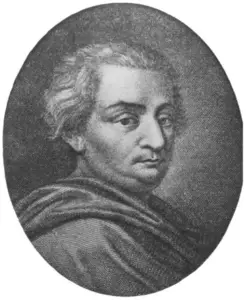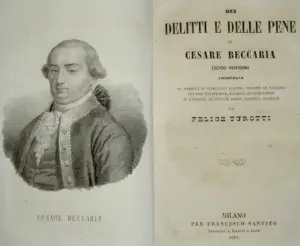Cesare Beccaria is seen by many people as the “father of criminology.” Here is a brief summary of his ideas and famous essay “On Crimes and Punishments,” both in video and text format.
Table of Contents
Discussions about Crime and Punishment
Cesare Beccaria is seen by many people as the “father of criminology” for his ideas about crime, punishment, and criminal justice procedures. He was an Italian born as an aristocrat in the year 1738 in Milan. At that time European thought about crime and punishment was still very much dominated by the old idea that crime was sin and that it was caused by the devil and by demons. And in part to punish the devil and the demons that were causing crime, very harsh punishments were used. At the time when Beccaria came along, the era of Enlightenment was in full swing, and scientists were starting to challenge the old views, but the people who had political power were not ready to leave those old ideas behind yet.
Beccaria didn’t start out as an intellectual. In fact, he wasn’t considered to be above average or interested really when it came to science or philosophy. But after he completed his law studies at the University of Pavia, he started to surround himself with a group of young men who were interested in all kinds of philosophical issues and social problems. And the intellectual discussions that Beccaria was able to have with these people led him to question many of the practices that were common in his time, including the way in which offenders were being punished for their crimes.
Publication of Beccaria’s “On Crimes and Punishments”
Beccaria’s famous work, “On Crimes and Punishments,” was published in 1764, when he was 26 years old. His essay called out the barbaric and arbitrary ways in which the criminal justice system operated. Sentences were very harsh, torture was common, there was a lot of corruption, there were secret accusations and secret trials, and there was a lot of arbitrariness in the way in which sentences were imposed. There was no such thing as equality before the law. And powerful people of high status were treated very differently from people who were poor and who did not have a lot of status.
Beccaria’s ideas clashed dramatically with these practices. And I’ll go through some of the central principles that his work is based on.
Only the Law Can Prescribe Punishment
According to Beccaria, only the law can prescribe punishment. It is up to the legislator to define crime and to prescribe which punishment should be imposed. It is not up to a magistrate or a judge to impose a penalty if the legislator has not prescribed it. And neither is it up to a judge to change what the law says about how a crime should be punished. The judge should do exactly what the law says.
The Law Applies Equally to All People
In addition, Beccaria said that the law applies equally to all people. And so punishment should be the same for all people, regardless of their power and status.
Making the Law and Law Enforcement Public
Beccaria also believed in the power of making the law and law enforcement public. More specifically, laws should be published so that people actually know about them, and trials should be public, too. Only then can onlookers judge if the trial is fair.

Beccaria: Punishments Should be Proportional, Certain, and Swift
Regarding severe punishment, Beccaria said that if severe punishments do not prevent crime, they should not be used. Instead, punishments should be proportional to the harm that the crime has caused. According to Beccaria, the aim of punishment is not to cause pain to the offender, but to prevent them from doing it again and to prevent other people from committing crime. In order to be able to do that, Beccaria believed that punishment should be certain and swift. He believed that if offenders were sure that they would be punished and if punishment would come as quickly as possible after the offense, that this would have the largest chance of preventing crime.
Beccaria Argued Against the Death Penalty
As another controversial issue, Beccaria argued against the death penalty. In his view, the state does not have the right to repay violence with more violence. And in addition to that, Beccaria believed that the death penalty was useless. The death penalty is momentary, it is not lasting and therefore the death penalty cannot be very successful in preventing crimes. Instead, lasting punishments, such as life imprisonment, would be more successful in preventing crimes, because potential offenders will find this a much more miserable condition than the death penalty.

No Right To Torture
Similarly, according to Cesare Beccaria, the state does not have the right to torture. Because no one is guilty until he or she is found guilty, no one has the right to punish a person by torturing him or her. Plus, people who are under torture will want the torture to stop and might therefore make false claims, including that they committed a crime they did not commit. So torture is also ineffective.
The Power of Education
Instead of torture and severe penalties, Beccaria believed that education is the most certain method of preventing crime.
Beccaria: Controversy and Success
Beccaria’s ideas are hardly controversial today, but they caused a lot of controversy at the time, because they were an attack on the entire criminal justice system. Beccaria initially published his essay anonymously, because he didn’t necessarily consider it to be a great idea to publish such radical ideas. And this idea was partly confirmed when the book was put on the black list of the Catholic Church for a full 200 years.
But even though his ideas were controversial back then, his essay became an immediate success. In fact, Cesare Beccaria’s ideas became the basis for all modern criminal justice systems and there is some evidence that his essay influenced the American and French revolutions which happened not long after the publication of the essay. His ideas were not original, because others had also proposed them, but Beccaria was the first one to present them in a consistent way. Many people were ready for the changes that he proposed, which is why his essay was such a success.
Beccaria ends his essay with what can be seen as a kind of summary of his view:
“So that any punishment be not an act of violence of one or of many against another, it is essential that it be public, prompt, necessary, minimal in severity as possible under given circumstances, proportional to the crime, and prescribed by the laws.”
You can find Cesare Beccaria’s full essay “On Crimes and Punishments” here.



